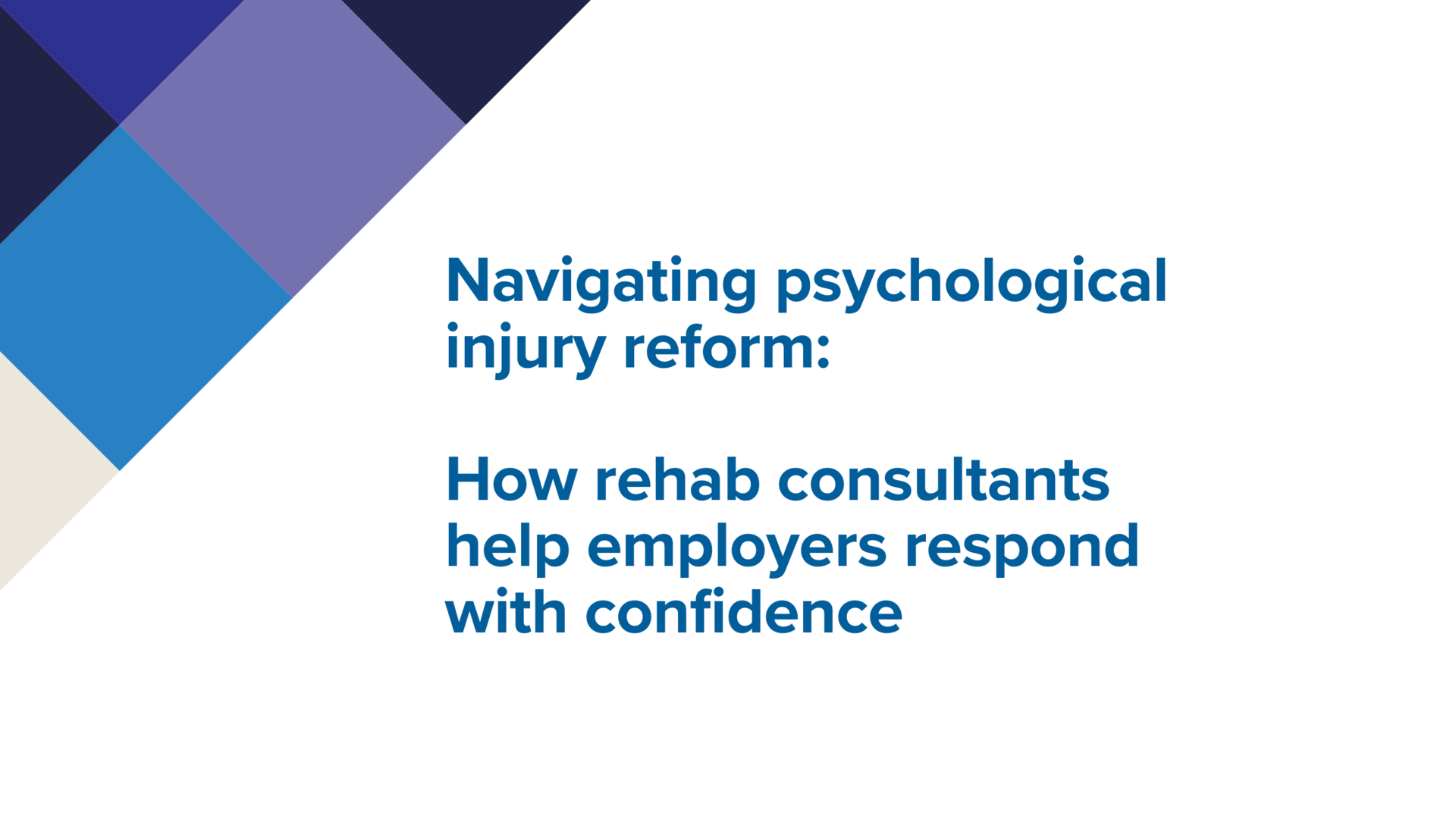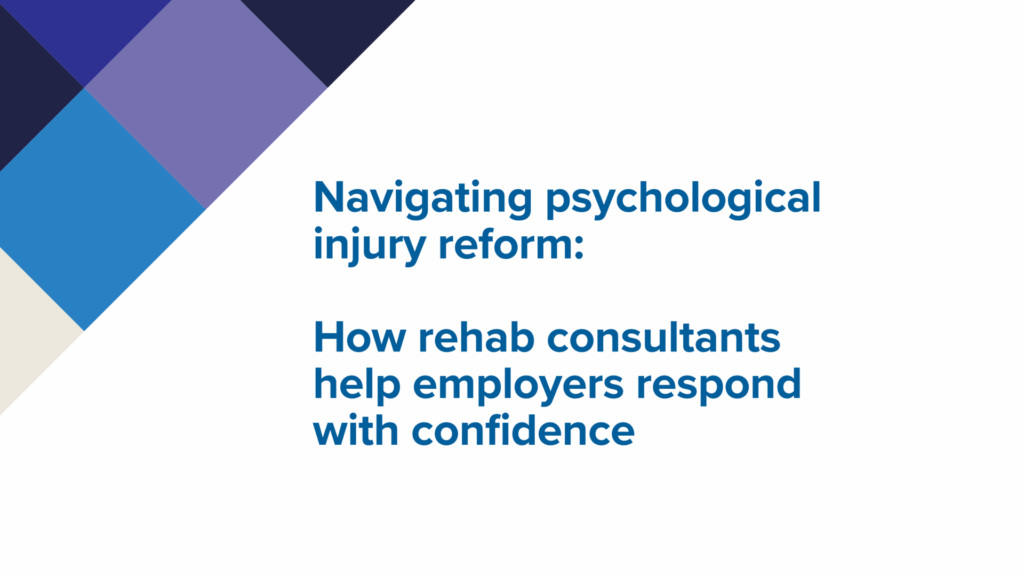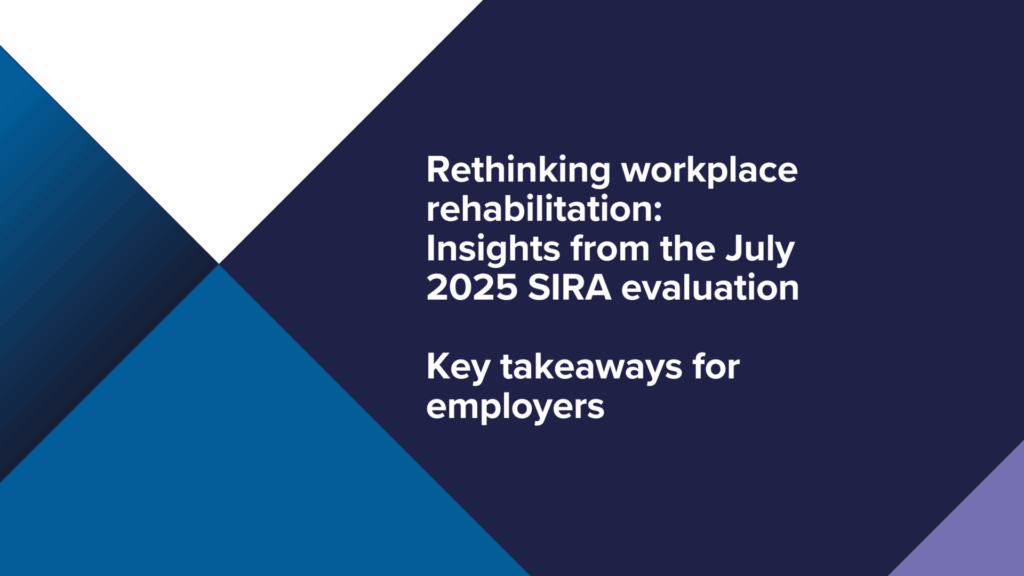Key takeaways:
- Psychological injury claims now make up 12% of major workers’ compensation cases in NSW—up from 7% five years ago.
- Reforms are tightening lump-sum payout criteria but may lead to more accepted claims due to stronger protections around bullying and trauma.
- Early intervention and support from rehabilitation consultants (RCs) lead to faster recovery and reduced costs.
- RCs help employers navigate reform by translating complex requirements into clear, practical steps for RTW success.
As psychological injury claims rise and reforms reshape the NSW workers’ compensation landscape, employers are asking:
- What does this mean for us?
- How will it affect our premiums?
- What’s the expected recovery timeframe—and how can we support it?
These are not just policy questions—they’re operational ones. And for many employers, the answers are unclear.
That’s where rehabilitation consultants (RCs) come in.
To help unpack these changes, we’ve drawn on the expertise of Nathan Dulyakarn, a Lead Rehabilitation Consultant at Interact.
With extensive experience supporting employers through complex psychological injury claims, Nathan offers practical insights into what the reforms mean on the ground—and how RCs can help employers respond with confidence.
What’s changing in psychological injury reform
The rules around compensation for psychological injuries—like stress, trauma, or bullying at work—are being updated in NSW.
One big change is that it’s now harder to qualify for large, one-off pay-outs (called lump-sum compensation).
But that doesn’t mean fewer people will be able to make a claim.
In fact, because the system now offers stronger protections for things like bullying and trauma, we might see just as many—if not more—claims being accepted.
So, employers shouldn’t assume this reform will reduce their risk. Instead, they need to be ready to act early and support their staff.
A recent government report found that psychological injury claims now make up 12% of all major workers’ compensation claims, compared to just 7% five years ago.
These types of claims are often more complicated, take longer to resolve, and can be more expensive.
That’s why it’s so important for employers to get help early—from experts like rehabilitation consultants—before things get worse.
These reforms are part of a broader shift in NSW toward value-based care.
SIRA’s 2025–26 priorities include improving support for psychological injuries, building capability across insurers and providers, and lifting the quality of rehabilitation services.
Employers who understand and align with these priorities will be better positioned to meet their obligations and support their workforce effectively.
“From my experience working with employers, the most consistent themes I’ve noticed are: What does this actually mean for us? How will it affect our premiums? What’s the expected timeframe for recovery—especially with psychological claims?” Says Nathan Dulyakarn.
The role of RCs: translating complexity into action
RCs are uniquely positioned to help employers understand their obligations and implement effective early intervention strategies.
Many employers are still unfamiliar with how RCs fit into the picture.
“Our role is to bridge that gap—educating, guiding, and supporting both the employer and the injured worker,” says Nathan.
The SIRA report found that workplace rehabilitation providers who engaged early and maintained consistent communication with employers and workers were more successful in facilitating sustainable return to work (RTW) outcomes.
“A lot of the time, employers aren’t even sure where Rehabilitation Consultants fit into the picture. That’s a big part of my role—helping them understand what they should be doing and where to begin. We simplify what can feel like a complex system and guide them through each step, whether it’s reviewing policies, engaging with claim service providers (CSPs), or planning a safe and sustainable return to work,” says Nathan.
By partnering with RCs, employers can turn complex reforms into clear, practical steps that protect both their people and their business.
Common employer questions answered by Nathan Dulyakarn
Does the reform mean fewer claims will be accepted—or just fewer lump-sum pay-outs?
“The reform doesn’t necessarily mean fewer claims will be accepted—it just means the criteria for receiving a lump-sum pay-out have become stricter.
“What I tell employers is this: don’t assume the risk has gone away. In fact, with stronger protections around bullying and trauma, we may see just as many claims being accepted.
“That’s why early intervention is so important. You need to be proactive in supporting your staff and managing psychological injuries before they escalate.”
What should we look for in a CSP?
“Transparency, responsiveness, and alignment with your values are key.
“RCs can help monitor CSP performance and ensure compliance, acting as a quality gatekeeper.”
Are there government programs we can tap into?
“Yes. SafeWork NSW offers mental health programs that include funding for wellbeing audits, manager training, and wraparound support.
“Many employers aren’t aware these exist—RCs can help you access them.”
How do we support a psychologically injured worker without risking further harm or team disruption?
“Supporting a psychologically injured worker requires a thoughtful and balanced approach. I always recommend starting with a graduated RTW plan—something that allows the worker to ease back in gradually.
“Flexible duties are key, as is access to psychological support. But just as important is clear communication with the rest of the team. Everyone needs to understand what’s happening and how they can help.
“This is where RCs really shine—we bridge the clinical needs of the worker with the practical realities of the workplace, making sure recovery is sustainable and disruption is minimised.”
Final thought
Psychological injury reform is complex—but with the right support, it doesn’t have to be overwhelming.
Partnering with a Rehabilitation Consultant helps employers navigate change with confidence, compassion, and compliance.
The evidence is clear: early, tailored, and collaborative rehabilitation works.
Employers who act now are better positioned to protect their people and their business.

Nathan Dulyakarn
Lead Rehabilitation Consultant & Exercise Physiologist




